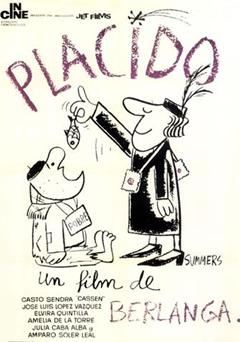Plácido

In a small provincial town a group of pious women, whose charity events are always ostentatious, organize a Christmas campaign called “Sit a Poor Person at Your Table”. To find support for their campaign they look for the sponsorship of some makers of pressure cookers, and invite a group of second-rate artists, who come from the capital city for this purpose, and are received with enthusiasm at the train station. The humanitarian day includes a colourful parade, a public auction for the guests and a carefully planned radio broadcast.
The person in charge of organising this ostentatious chain of events is Quintanilla, who has hired Plácido for the occasion, a poor man who has to cooperate with the three-wheeled van he has just bought and hasn’t even started to pay for. The action-packed activity that Plácido is involved in prevents him from paying the first instalment of the van before the deadline, which ends that night. From that moment on, Plácido tries to find a solution to his problem by any means he can, while he is taken from one place to the other, and is involved in a series of unexpected incidents, including an especially embarrassing one that stands out. A beggar has an angina during the dinner, so the organization committee has to go to the house where he had been taken in. When they get there, they find out that the dying man is cohabiting with a female indigent and they decide to improvise a wedding so that death will not find him living in sin. After that, Plácido’s three-wheeled van is once more summoned to take the deceased to the shack where he used to live.
Production: Jet Films, S.A. (Barcelona).
Director: Luis García Berlanga.
Story: Luis García Berlanga and Rafael Azcona.
Screenplay: Luis García Berlanga, Rafael Azcona, José Luis Colina and José Luis Font.
Director of Photography: Francisco Sempere (B/W).
Music: Miguel Asins Arbó.
Editor: José Antonio Rojo.
Set Decorator: Andrés Vallvé.
Executive Producer: Alfredo Matas.
Production Manager: Narciso Munné.
Production Chief: José Manuel M. Herrero.
Assistant Director: Juan Estelrich. Continuity: José Luis Font. Second Cameraman: Miguel Agudo and Eduardo Noé. Assistant Camera: Toni Sala and Antonio Millán. Still photographer: Emilio Godes. Production Assistants: Ramón Baillo and Luis Fernández. Unit Production Manager: Enrique Barrés. Make-up Artist: Rodrigo Gurucharri. Hair Stylist: Vicenta Salvador. Assistant Make-up Artist: Teresa Plumet and Carmela Terán. Set Dresser: Antonio Cortés. Sound Engineer: Felipe Fernández. Assistant Editor: Carmen Fábregas and Conchita Pino. Assistant Decorator: Domingo Bronchalo. Furniture: Ramón Miró. Costume Design: Peris Hermanos. Set Constructor: Enrique Bronchalo. Film Studios: Orphea Films, S.A. (Barcelona). Soundtrack: Estudios Exa. Sound System: Westrex Recording. Laboratory: Cinefoto (Barcelona).
Cast
Casto Sendra “Cassen” (Plácido), José Luis López Vázquez (Gabino Quintanilla), Elvira Quintillá (Emilia), Manuel Alexandre (Julián), Mario de Bustos (don Rodolfo), María Francés (nun), Mari Carmen Yepes (Martita), Roberto Llamas (Olmedo), Amelia de la Torre (Mrs. Galán), José María Caffarel (Zapater), Xan das Bolas (Rivas, the administrator), Fernando Delgado (Bañares), Laura Granados (Erika), Juan Manuel Simón (Roberto Bonifaz, the young heartthrob), Carmen Valencia (Maruja Collado), Gloria F. Osuna (Lali), Francisco Aguilera (Francisco Aguilera), José Álvarez “Lepe” (Emilia’s father), José Orjas (Mr. Gil, the notary public), Félix Fernández (the Galans poor man), Erasmo Pascual (old officer at the notary), Agustín González (don Álvaro Gil), Julia Delgado Caro (doña María Helguera), Antonio Gandía (Pascual), José Franco (don Matías Helguera), Amparo Gómez Ramos (Antonia, the Helgueras’ maid), José Gavilán (dentist), Luis Ciges (the dentist’s poor man), Ángel Company (priest), Julia Caba Alba (Concheta), Antonio Ferrandis (Ramiro), Amparo Soler Leal (Marilú), Jesús Puche, Juan G. Medina, Juan Torres, Xavier Vivé, Camino Delgado, Carmen Pradillo, J.C. Tejeiro, Carmen Contreras, Emilio Sancho, Vicente Llosá
Awards
Oscar nomination for best foreign language film; Golden Palm at the Bordighera Festival of Comedy and Humor Films.
Award for best film and best supporting actor (Manuel Alexandre) from the National Syndicate of Spectacle, Spain.
Award for best film, best director and best co-starring actor (José Luis López Vázquez) from the Cinematographic Writers Guild.
Sant Jordi Award from Catalan cinema critics for best film, best director and best actor.
Award for best film from the Triunfo magazine.
Filming Location
Manresa (Barcelona).
More information
Release Date: 13 November 1961.
Official Film Rating: Primera A (First Class A).



























